Richard Goodman's Blog, page 13
July 1, 2023
Darren!
We had plumbing problems. Or, more specifically, drainage problems. The house we live in is old. Small, too. The plumbing is not new. It’s basic, PVC, exposed underneath the house. Ugly-looking, PVC is! I don’t like the blazing, plastic whiteness of it and the small black writing on its side. It’s about as unattractive as you can get, and it’s a constant reminder of how we’re not helping the Earth by using this indestructible stuff. Everyone uses it, but that’s no excuse.
Anyway, our sinks had been backing up. Water standing. Didn’t leave. That’s what we’d been experiencing for months. We tried snaking with a snake that belonged to Gaywynn’s father—not overly long, but a snake, still. No luck. We had to open one end of the PVC pipe and let the gray water drain onto the front yard, not where it’s supposed to go. Gray water. What a term.
That draining gray water caused pooling near the house. Not desirable. I bought bags of rocks and emptied them onto the pool, smothering it. Still the ground was always spongy and damp and smelly, and, now that it’s summer, a breeding ground for insects. I could see them emerging from the quagmire.
This came to a head. I couldn’t take this way of living anymore. Much less the complete impracticality of a sink that doesn’t drain. Some things are an adventure when you’re in your twenties but are just depressing when you’re 77, my age. Discussing this, we had visions of all the plumbing needing to be replaced. It already looks jerry-rigged, something that might at any moment collapse. Money is short here, and that potential major replacement made us worry to no end.
Despite those money concerns, we’d had enough. We needed a plumber. Gaywynn searched the Internet. Criteria? We wanted someone local. Someone with a small business. We didn’t want a big enterprise that might treat us casually and overcharge us.
Gaywynn found Darren Aucoin’s Plumbing in Scott, LA, near where we live. That’s in the country, about three hours west of New Orleans. Actually, Gaywynn had first seen one of his trucks in town. So, I called Darren. His voice mailbox was full, so I texted him. Everyone texts these days. The junk removal guy, the sewer guy, the lawn care guy, everyone. Later, Darren called me back. I explained the problem, as well as I could.
“I can come by today around 4pm,” he said.
“Great. See you then.”
By 4:30, he hadn’t arrived. I called him. He was stuck on another job due to unexpected circumstances. He was apologetic, sincerely so. You can never fault someone for unexpected circumstances. We arranged for him to come by the next morning between 6:30am and 7. Better. Cooler. The goddam heat is in the high 90’s here. Heat index of 115, or something surreal and miserable.
The next morning, at 7:15am, Darren pulled up to our house with his white truck. I was waiting. He got out, and we shook hands. He’s a slim, slight man, with a face and hands that, I could tell, have seen labor. His work clothes had most likely experienced the underside of quite a few houses. He was all business. I walked him over to the house. He looked underneath, peered at the pipes, looked up at me.
“Needs snaking. That’s all. That’ll solve the problem.”
“Really? That’s all you need to do?”
“Yep.”
That sounded too good to be true. But what if it was.
I asked him how much that would cost. $150, he said. God, what a blessed number. We had visions of $750, maybe more. Money we really didn’t have.
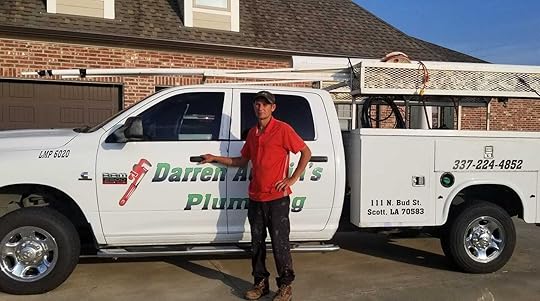 Darren Aucoin, my hero
Darren Aucoin, my heroHe got a huge wheel of a snake from his truck and brought it over to the house. He worked efficiently and briskly. No hesitation. As he was working, he asked me, without looking up, “Where’d you find me? In the phone book?”
Do people still own phone books? I know we don’t have one. When was the last time I even saw a phone book?
“We looked on the Internet.” I told him that we’d searched for a local plumber, a small business. And why. He nodded.
He opened the valve at the end of the PVC pipe, and the infamous gray water gushed. He waited until it waned. Then he inserted the snake. More and more and more snake. More. And more. Endless snake. Later, he said it was sixty feet he snaked through the pipe. I didn’t know we had that much pipe that was snake-able. He retracted the snake, gunk accompanying its withdrawal.
“Grease,” Darren noted.
I felt a bit guilty. Who pours grease down their drain? I looked away.
He had me keep the water running in the kitchen while he did all this. At one point, I went back inside to have a look. It was draining! Could the problem have been fixed? It seemed so! A huge sense of relief flowed through me, snaking out all worry. Then Darren went to the other side of the house and replaced some pipes we had rigged to help the draining. They were only temporary, and really hadn’t helped that much.
I thanked him with as much ardor as if he’d saved me from drowning. In a way, he had. I wrote him a check. He wrote me an invoice. While he was doing that, he said,
“You’re up early.”
“That when I do my work. I’m a writer.”
“A writer?” he responded neutrally, as if I’d said I liked ketchup.
“Yes, but in terms of making money, I’d rather be a plumber.”
No response. I suppose he knew it was true. He gave me the invoice. We shook hands.
He turned to leave, then paused.
“Call me if you need anything else,” he said.
He got into his truck, pulled out of the driveway, and then he was gone. It wasn’t even eight o’clock yet.
All day I basked in the relief of this problem solved, in the blessed sight of water draining. It’s amazing how something mundane as that can provide you so much satisfaction.
Somewhere in John Steinbeck’s wonderful book, Travels with Charley, his dog, the eponymous Charley, becomes sick. Steinbeck finds a vet, a young man, who takes Charley with him and, later, returns with a now-healthy Charley and some medicine. Steinbeck is greatly relieved.
Steinbeck writes, “There’s absolutely nothing to take the place of a good man.”
Darren, this means you.
June 16, 2023
What are you calling her?
I was at a dinner party in New Orleans not long ago. The people were smart, educated and hip, as they used to say. I guess I still do. After dinner, we sat around talking. The subject turned to present-day music. Someone said that today’s music couldn’t hold a candle to the music of the 60s.
“Nobody is making music that can compare to the Stones, the Beatles,” one woman said. “Nobody. Not even close.”
Others nodded.
“Look at who’s selling,” another woman said. “Taylor Swift, for God’s sake!”
She said the name disdainfully, as if she were spitting out a bad clam.
“I take it you don’t like her,” I said.
“No, I don’t,” she said, anger rising in her voice. “I do not. I think Taylor Swift is a bimbo.”
All sorts of thoughts raced through my mind. The first was: What?
“Bimbo,” as defined by Oxford U. Press is “an attractive but unintelligent or frivolous young woman.” There are variations on this, but it all comes down to this: pretty but stupid. How, in any universe, in any stretch of the imagination, can you apply that definition to Taylor Swift? How is she unintelligent and/or frivolous? How is she stupid?
There was also something disturbing about one woman calling another woman a bimbo. All sorts of elitist feminism thoughts came to mind.
It’s easy to look down on Taylor Swift, if that’s your choice. There’s her astonishing success, to begin with, always a target. She’s on a tour now that, when announced, broke Ticketmaster. Melted it. Her records have sold—well, we’re talking numbers in the light years range. So, let us not overlook the possibility of envy with this kind of reaction.
Yes, as the common observation goes, Swift writes about her boyfriends and her breakups. So? Joni Mitchell wrote about that, too. (“Help Me”) Many other songwriters have. Swift doesn’t just write about her breakups. Far from it.
Let me direct you to a brief but striking clip, an interview with the late Kobe Bryant about Taylor Swift. Yes, the basketball star. Have a listen to what he says about her. Why am I asking you to listen to Kobe Bryant? Because he represents excellence, determination, hard work and a kind of genius. Because he understands Taylor Swift’s achievement and because he articulates it so well.
As Kobe says, you don’t have to like Swift’s music. Given. That’s not the point.
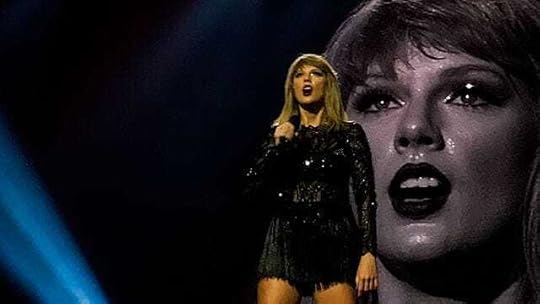
I like Taylor Swift’s music. Not all her music, but it’s rare that I like all of anyone’s music. I particularly like the two albums she made during Covid, folklore and evermore. Some lovely music there. If you don’t agree, fine. Dislike her music all you want. Again, not the point. But, a bimbo?
Why am I even discussing Taylor Swift? Aren’t there more pressing issues? (Always are.) Because, through the years, I’ve encountered lots of snobbism, much of it in the arts. It’s a kind of elite bullying. Subgenre: hopping on the bandwagon. That goes beyond Taylor Swift. Far. I find it very unappealing. Funny thing, though, people who look down at a certain artist often change their minds when the so-called arbiters decree that artist’s work is worthy.
Stephen King, for instance. He’s never been unpopular, of course, but he was, at one, time, given airport-reading accolades, put in his place. Still is, by some critics. He has been given that most stinging of descriptors, hack. His response? “The intellectual’s definition of a hack seems to be an artist whose work is appreciated by too many people.” (Speaking of, Forbes Magazine reports that 53% of adult Americans are fans of Taylor Swift.) Now, King’s work appears in The New Yorker. Is he a different writer? No, not in the essentials that made him who he is. But now it’s deemed by those who deem these things that it’s acceptable to take him seriously.
Will that bimbo-caller change her tune about Taylor Swift if it’s ever deemed acceptable by the intellectuals to like her music?
No jaw-dropping from me if she does.
June 14, 2023
Transplants: from Cairo to Lafayette
I talk with Will McFarlain about his growing up in Cairo, Egypt, his subsequent travels and his landing, at last, in Lafayette, Louisiana. We talk about the idea of being a transplant and how growing up in a very different culture prepared or didn't prepare for him to live in Cajun country, Louisiana.
June 9, 2023
Homage to Charles Salzberg
He probably wouldn’t approve this message.
Charles Salzberg doesn’t blow his own horn. So, consider this a public service announcement. To let you, the world, know a few things about him.
Charles is a celebrated mystery writer, a superlative teacher, and an old friend. He wrote, among other thrillers, the Henry Swann series of detective novels, including Swann’s Way Out, Swann’s Lake of Despair and Swann’s Last Song. A writer no less than Lee Child has praised his work. Take a stroll through his website for the full story.
Charles has spent a lifetime helping other writers.
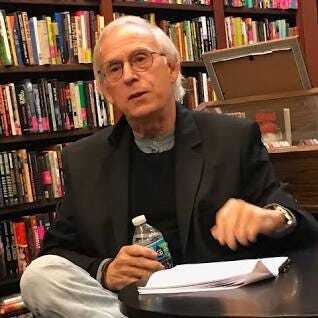 Charles Salzberg
Charles SalzbergI know. I’m one. I remember many years ago when he got me a job. I was broke—not an uncommon situation at the time. Desperate. He got me a gig writing for a guidebook. Saved me! I could pay the rent! Just recently, he gave me the name of an editor he knows to whom I could send my new manuscript.
I know for a fact that legions of writers are beholden to him, though he would never see it that way. He’s gotten writers jobs. He’s gotten them readings at places they wouldn’t have had access to. He’s turned them on to his agent. (Many writers I know wouldn’t dream of doing that. Believe me, I’ve asked them.) He’s edited their work. When, for a while, he was a publisher himself, he published their books.
When I showed this piece about Charles to a friend, she said, “Can’t you give some more examples of his helping?” Yes, I can, but I don’t have the right to name those who have benefitted from Charles’ generosity. That’s his privilege, and I’m certain he wouldn’t do that. Look at it this way: I think if you gathered all the writers in New York City into a single room—or, more likely, into a single bar—half of them would have been helped by Charles over his forty-plus years, and counting, of largess.
Not to mention that, as a teacher, he’s inspired and guided hundreds of writers, some on to fame and fortune, all to a better sense of who they are, and can be, as writers.
Sometimes those of us who have benefitted from his aid swap stories about his generosity. We’re like a fraternity. A sprawling fraternity. Charles never asks for anything in return. It’s amazing to me that he still has time to write. He’s probably helping someone right now.
Brought to you by the committee to thank Charles Salzberg.
June 3, 2023
Little armored one
Our dog saw something.
She was standing stock still, left foot raised in classic pointer pose. She was positioned where our lawn ends and becomes heavy brush. She was tightly sprung, fixed. I thought it must be a squirrel, or a rabbit, her favorite pursuits. I walked toward her. As I did, she released her stance, moved toward the brush and gingerly inserted her head into the undergrowth. Then she jumped back. I thought then it might be a snake she’d found.
I walked up to her.
“What do you see, girl? What is it?”
She looked up at me, seeming to say, “Can’t you see?!??”
I peered into the brush and saw grass and branches moving. Something was there. I carefully moved branches aside, peering. Then I saw it. An animal, unmistakable. Moving slowly through the underbrush, not big, pausing to forage and probe, seemingly oblivious to the two creatures looking down at it.
An armadillo.
What a strange animal! It looks like it hasn’t read Darwin. When you see an armadillo, you immediately think, well, no evolution here. This creature seems like it stepped out of a time machine. I think partly this is because it uses armor as a defense, and no other mammal on earth does. In any case, the armadillo looks like it belongs to another time—a four-legged Sir Lancelot.

The name, armadillo, from the Spanish, means “little armored one.”
Its range—we’re speaking of the nine-banded armadillo, Dasypus novemcinctus, the only species in North America—is the South, from Texas to Florida and as far north as Oklahoma and Kansas. That range is increasing. Thank you, climate change. As it gets warmer, the armadillo’s range will increase. Cold is not its friend. It eats worms, grubs, and other insects it finds with its sharp claws.
So, yes, armadillos are here, in rural Louisiana. You just don’t see them that often, because they’re nocturnal. Why this one was rummaging about in stark daylight, I have no idea.
I peered at the armadillo as it went about its search. Its head looks like a giant mouse head. Large, rodent-like ears. Later, I learned it has poor eyesight, sharp sense of smell. It’s actually quick; it can scurry surprisingly fast. It grows to be a maximum of about 15 pounds—not that big. Its closest relatives are the anteater and the sloth. Makes sense.
Odd fact: armadillos are among the few species other than humans capable of catching leprosy. It seems they originally contracted the disease from humans. (Heard that before?) Speaking of that, the only hospital that uniquely treated patients with leprosy in America is in Louisiana, in Carville, about an hour from where we live. It’s now a museum.
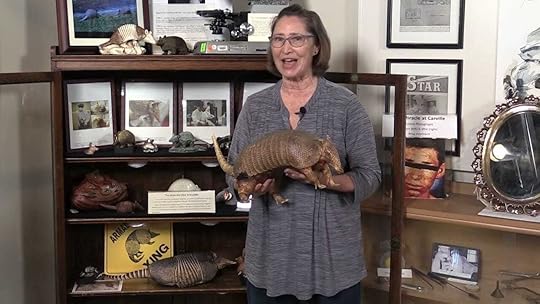 From the The National Hansen's Disease—i.e., leprosy—Museum website.
From the The National Hansen's Disease—i.e., leprosy—Museum website.Our dog wanted to go in after the armadillo. Gaywynn called her back, and reluctantly our dog complied. I kept my eye on the armadillo, watched it as it inserted its head under leaves and probed with its snout and claws. The armadillo didn’t notice me, even as I edged closer to it. Or maybe it just ignored me. It seemed too busy to care. Eventually, it wandered away into the deeper brush and disappeared.
When you see a creature like that, a holdover from a far distant era, it lifts you into the realm of awe. It’s tiring to be human, to maintain that sense of superiority we have. Until we encounter something in nature that overwhelms our pretension. It may be a gigantic thunderstorm, an osprey, a sequoia—or an armadillo.
I’m appreciative when wonder makes me lose myself.
May 27, 2023
My funeral arrangements were made by...
Me!!!
What a surreal thing to do. But, actually, fascinating.
Here’s the thing. I don’t want to leave behind a mess. I know too many people who, for whatever reason, have not even drawn up a will. People my age, which is 77. When you should have a will. Thus, upon their demise, leaving a mess for others to contend with.
I live with my girlfriend, Gaywynn, in rural Louisiana. She has enough of my messes to deal with while I’m alive.
I do have a will. I also have made arrangements for my funeral. And paid for them. I made these arrangements nine years ago in 2014. So, thinking it was a good idea to update some information and to ask a few questions about the process, I called the funeral home.
I spoke with a woman named CC. She walked me through everything patiently. Let me do the same for you. I know—just what you were hoping I’d do!
The first thing I wanted to know was what, exactly, happens after I die? I don’t mean cosmically or physiologically, but practically. “Should my girlfriend call you after I die?” I asked CC.
“That depends,” CC said. Her voice was soothing. Utterly relaxing. “If you’re in hospice at home, then it would be good for the hospice nurse to call us a few days before. If you die at a hospital, or suddenly, then your body might have to go to the coroner and then someone would call us after the body is released.”
 My final destination. Isn’t it lovely? Note stained glass windows.
My final destination. Isn’t it lovely? Note stained glass windows.I was following my own body as it made its way through this process. I was in CC’s capable hands. Suddenly, I had this Pietà-like vision of her cradling my body in her arms. Well, let’s not get too crazy here. Let’s just say it was comforting going through this with her. She was straightforward and clear without being sentimental. Hard thing to do.
“So, everything is already paid for, right?” I was reconfirming. I didn’t want any hidden clauses jumping out of the casket, startling Gaywynn.
“Yes, except…”
Uh-oh.
“You have money set aside for certain charges, but these charges may have changed since you took out your policy. For example,” she said, “in 2014, the coroner’s fee in New Orleans parish was $30. Now it’s $150. So, your girlfriend might have to pay for the difference.”
That seems fair. Inflation. To be expected. “But other than that,” I said, “the charges are taken care of? The cremation costs?” That was my preferred choice of disposal.
“Yes. The only matter to be resolved is what to do with your ashes. We can mail them to your girlfriend. Or we can keep them here until she comes to get them.”
Via regular mail? Actually, I haven’t thought about what I want to do with my ashes. Or, should I say, what I want done with my ashes. I don’t have any spread-them-at-sea scenarios. I’ll have to think about that. I can’t afford to have them shot out of cannon, à la Hunter S. Thompson, though that sounds appealing. Ideas, anyone? DM me.
She also walked me through the process of how the funeral home would retrieve my body. CC was so pleasant, I almost wanted to let her take my body right then and there. I wasn’t talking from beyond the grave, but near to it. I felt reassured knowing CC might be there to watch over me.
By the way, whenever I talk about these kinds of post-mortem things with Gaywynn, she looks at me sternly and says, “You die, I’ll kill you.”
I thanked CC for everything.
“It’s good to have all the details worked out,” she said.
I said it definitely was.
“You sound like you’re in good health,” CC said.
“Knock on wood!”
“We don’t don’t want to see you anytime soon!”
May 20, 2023
Bob Goodman
When he lay dying, I flew from New York to Virginia Beach, Virginia, where he lived. I needed to tell him something.
He was my uncle, my father’s older brother. Robert Goodman, aka Uncle Bob. I had grown up in the same town where he lived with my aunt and their four kids. I saw him often. He was tall, taller than my father, maybe six feet. He was a sweet man, smiled often and gave me the great gift of listening to me and talking to me as an equal.
He took advantage of life. He enjoyed the pleasures and enlightenments it provided. He lived near the beach, as we did, near the ocean, and, unlike my father, he would go there every day to swim or walk. Sometimes I would see him there in the morning when I went surfing. His lanky, trim body would be streaming with salt water, and he would have a great smile on his face as he dried off with a towel. “Hello, Richie,” he would say. “It’s a beautiful morning. Good to be alive.”
He was in the same profession as his father, real estate. My own father chose another path to make a living. I never knew my grandfather, their father; he died when I was a baby. But when I look at photos of my grandfather, I see Bob more than my father.
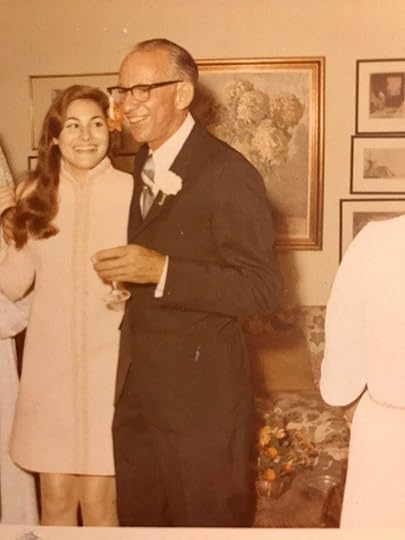 Bob with his niece, Andrea.
Bob with his niece, Andrea.My uncle Bob loved to read, and had rows and rows of books in his house. We had no books in our house. When I was old enough to care, I would scan the titles. Many I didn’t know, and he would tell me about them. He also made great use of the local library. I always found the practicality of his using the library encouraging.
I felt warmth and goodness from him. I felt acceptance. I felt love. None of which were at my own home, and so I imbibed them greedily and happily when I visited his house. At one point, we lived very close to him and his family. Our houses were about a ten minute walk apart, if that. We shared a lake. After my parents divorced, and I went away with my mother, I was in Virginia Beach mainly in the summers. Our families saw each other often then. They would come to our house or we to theirs. Later, my father and stepmother built a new house near the ocean, and Bob would often park his car at the house when he went to the beach for his morning swim. I would see him then, afterwards, refreshed, exuberant, like the old days.
Books meant something to Bob. They were part of his life. A significant part of his life. I remember once we discussed Catullus, whom he liked very much. So, when I began to write and told him about that, he was pleased and he made me feel as if I was doing something worthy and real. In other words, that being a writer was something which a grown man could aspire to.
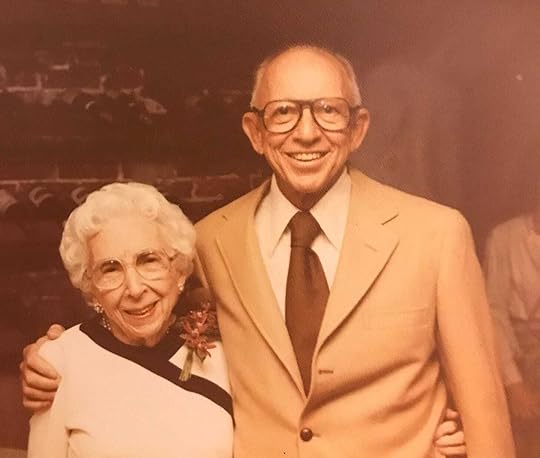 Some years later, Bob with his mother, my grandmother.
Some years later, Bob with his mother, my grandmother.I started writing with purpose and conviction when I was a sophomore in college. I began writing fiction. I was around 19. I took one of my stories to Bob and asked him if he would read it. He said, of course. He took the story from my hand right then and there went to his room to read it. I waited anxiously in the kitchen. After an agonizing length of time—probably twenty minutes at the most—he came back with my story in his hand. His wife, Augusta, my aunt, happened to be in the kitchen.
He turned to Augusta and said, “Richie always manages to find the right word.”
No one had spoken to me like that about what I wrote. No one had responded to the very thing I tried with all my heart to do. I burst with pride and gratitude. And those words, coming right then, when I was commencing to write, stood me in good stead and fed my passion for years to come.
A year later, he gave me one of the best gifts anyone has even given me—a Smith-Corona manual typewriter. A beautiful machine, hard-working and loyal. I received it with as much excitement as I imagine Arthur did Excalibur. It stood by me for decades.
Years passed. I wrote a book. It was written mostly on the typewriter Bob gave me. The book was published. I sent Bob a copy, and he liked it very much. Characteristically, he wrote me a lovely letter saying that he was proud to know the person who had written the book. Proud to know me! I wrote more books, wrote essays and articles. From time to time I would send them to him, and he would read them and tell me how much he liked them. His support never wavered.
I was living in New York when I received word in 2006 that Bob was dying. He was 93, so it wasn’t a surprise, but nevertheless I was shocked to hear. He had taken great care of himself, and so even at 93, I thought he had more time. I flew down to see him. When I reached his home, he was sleeping deeply most of the time, and it was impossible to talk to him. I could see his slim figure on the bed through an open door, his chest scarcely rising and falling.
I said to my aunt, “Please tell Bob something for me. It’s important. Please tell him that he was the reason I became a writer.” She promised me she she would.
I often still draw on those words of his spoken to me with such sincerity and directness so many years earlier. A writer can be fueled and inspired for many years by meaningful words spoken at the right time in his life. Especially when he is young. They can be a lifeline in times of discouragement and darkness. Bob was a giver of light, and I basked in it and felt its warmth. I still do.
May 13, 2023
Wish you were here
"Mothers are all slightly insane," Holden Caulfield says at one point in The Catcher in the Rye. I always knew what he meant. It was never a quote that I puzzled over. In five words, he nailed it.
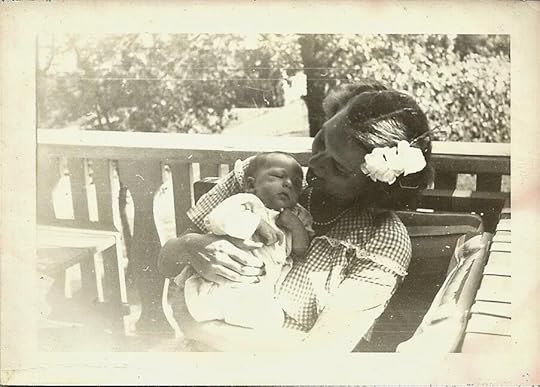 My mother holding me, age 7 weeks
My mother holding me, age 7 weeksYes, mothers are all slightly insane, some more slightly than others. They're insane because they can never be certain, ever, that their child(ren) is(are) completely without harm. They are on some kind of alert twenty-four hours a day, 365 days a year, always. Some part of them never sleeps. You can't be that attentive and worried for that long and not be slightly crazy. Combine this worry with powerlessness—as soon as the boy or girl steps out of the house (out of the room, actually), they can't do a thing to protect them.
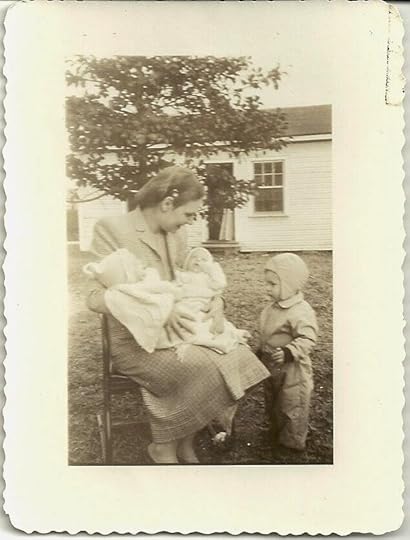 Holding her twins with me pondering. She had three children within eleven months.
Holding her twins with me pondering. She had three children within eleven months.I think of my own mother, of her difficult life, and of her living alone after her divorce. For years. I think of all that she tried to do with that ache and pull toward her children. I think of her carrying that ache of loving me and that love unrequited, and how can you stand that day after day year after year? She used to say to me, "I get lonely for you, Richie." I think of her probably feeling she hadn't been a good mother, and how that must have devastated her after worrying about us so deeply and so continuously. I think of her bright, sharp mind, love of writing and reading and of her unblemished soul. I think she did the best she could.
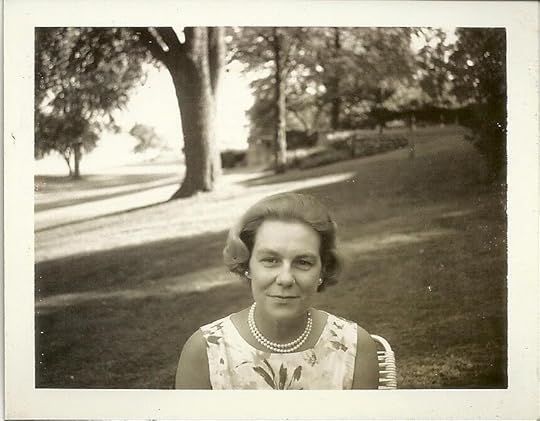 In Old Greenwich, CT, sometime in the 1970s.
In Old Greenwich, CT, sometime in the 1970s.It's too late to tell her that I love her. I tried to do justice to her memory in a piece called "The Wheaton Girl.” She went to Wheaton College. "The happiest days of my life," she told me. I doubt she'd like it, even though I wrote of of her intelligence and of her kindness. She didn't want her weaknesses exposed, and who would? I wrote another about watching her hang out the wash when I was a kid. Still not right. I'm not here to say anything silly like, tell your mom you love her before it's too late. (Or maybe I am.) I'm just here to say to you, Mom, you deserved better. But I can't. I think about you every day. I wish your life had been easier. I hope you've found peace. Happy Mother’s Day from your son.
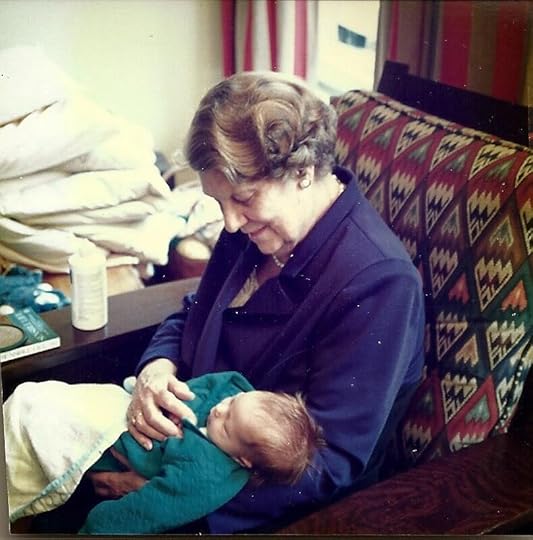 The only time my mother saw my daughter, Becky.
The only time my mother saw my daughter, Becky.
May 12, 2023
The veiled lady and the bird man
One mid-February day in 1821, John James Audubon1 was walking down Royal Street in New Orleans’ French Quarter.
Audubon had been in New Orleans for about a month, scrounging a living drawing portraits of whoever would pay him. Much as people still do today in Jackson Square in the city. He was thirty-six. It was not an easy time. His wife, Lucy, was in Louisville with their children. He had little money, if any. It was just a year earlier that he had made the great decision “to compleat a collection of the Birds of our country, from Nature, all of natural size.” He was in New Orleans and environs to seek out birds he had not yet found and painted.
That particular day, he was hauling his portfolio of drawings with him, when he was approached by “a female of fine form,” as he wrote later. She wore a veil that obscured her face. She asked him if he was the one who drew “the birds of America.” And if “you are he that draws likenesses in black chalk so remarkably strong.”
Yes, he said, he was.
She then, abruptly, asked him to come to her house at 26 rue Amour in thirty minutes.
“I will wait for you,” she said. Before walking away, she added, “Do not follow me now.”
Rue Amour is today’s Rampart Street, in a part of New Orleans called the Marigny. (The Marigny is where I lived for ten years.) It was a bit of a walk for Audubon. I wonder: what made him do this? Here was a woman he did not know, whose face he could not see, asking him to come to a house he’d never been in. This was 1821. The world was a tenuous place then.
Who knows what was waiting for him? But this was a man who thought nothing of going deep into a wild forest alone, staying there, unprotected against cold rain and biting insects for days, to get a glimpse of a bird he knew was there, somewhere. Besides, this might mean some desperately-needed money.
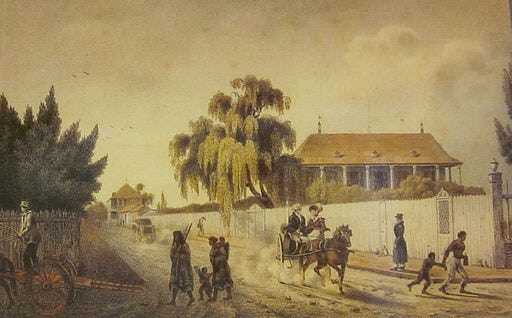 The Faubourg Marigny, in New Orleans, in 1821. (Illustration from the Historic New Orleans Collection.)
The Faubourg Marigny, in New Orleans, in 1821. (Illustration from the Historic New Orleans Collection.)He went. At the house, the woman, still veiled, greeted him. She shut the door with a double lock. Audubon was “trembling like a leaf.” Then she threw back her veil and showed him, “one of the most beautiful faces I ever saw.”
“Will you keep my name if you discover it and my residence a secret?” she asked him.
He would.
“Have you ever drawn a full figure?” she asked.
Yes, replied Audubon, he had.
“Naked?”
This was not one of the birds of America. “Had I been shot with a 48 pounder through the heart,” Audubon wrote, “my articulating powers could not have been more suddenly stopped.”
This is what she wanted. For him to draw “my likeness and the whole of my form naked.” She would compensate him, of course.
This was turning out to be a very interesting day. He agreed. Why not?
The young woman went behind a curtain and undressed. Then she asked Audubon to draw the curtain, and there she was, completely naked, lying on a couch. In a droll understatement, Audubon wrote, “I could not well reconcile all the feelings that were necessary to draw well, without mingling with them some of a very different nature.”
He drew her figure for an hour and then stopped for the day. The woman got dressed, insisted Audubon stay, and gave him something to drink and eat. They talked for two more hours. She asked him “a thousand questions about my family, residence, way of traveling and making a living.” Then he left.
At her bidding, he returned every day, at the same hour, for ten days. The visits followed the same routine. “I had the pleasure of this beautiful woman's company about one hour naked, and two talking on different subjects.”
Finally, he was finished. The woman was pleased with Audubon’s work. And what would she give him as payment? Not money, but a gun. “One who hunts so much needs a good gun,” she said. On the gun was engraved, “Don't refuse this gift of a friend who is in your debt—may it equal you in goodness.”
 John James Audubon. Is that the gun?
John James Audubon. Is that the gun?Fascinated and entranced, he returned to her house several times later to have one more look at the drawing to make sure it was as good as it could be, but each time he did, he was told by a servant that the woman wasn’t home. He never saw her again.
I imagine the woman wanted the portrait for her lover. I hope the drawing still exists somewhere—perhaps in one of the city’s second-hand stores, in a neglected bin. Or, even better, hanging on the wall of a New Orleans home now occupied by the descendants of the man who was her lover, looking down on them, beautiful, naked, still guarding the secret of who she really was.
1If recent revelations about Audubon disturb you, then you won’t enjoy this post. If you’re still in the mood to read, though, let me suggest this post about my session with a personal trainer.
May 5, 2023
Donkey!
There was a donkey born this last fall near us. He’s grown since then, of course. He’s now in that sweetness-to-die-for stage. He’s still smaller than both his parents. They all graze together in an open field we pass on the way to town in rural Louisiana where we live. He stays near his mother, as young animals do. His coat is still more shaggy than smooth, and its color is a shade lighter than his mother’s dirty gray. It’s somewhat tawny. That won’t be for long. He even has bangs. It’s a joy to watch him munch his grass just like a grownup, surely and steadily, taking a small step or two every so often to find uneaten blades. We want to take him home with us.
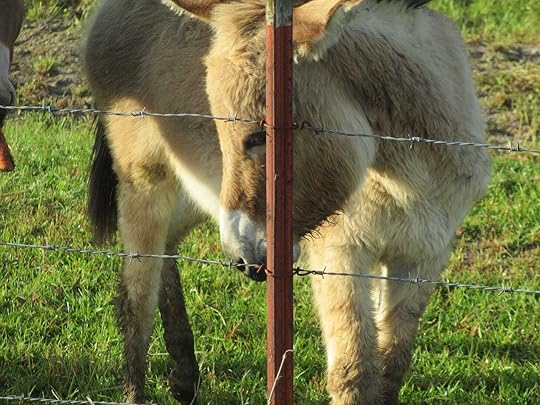 Non-professional photographs of actual donkey(s) here, and below.
Non-professional photographs of actual donkey(s) here, and below.Maybe it’s partly because I’m 77. Seeing this little animal, so young, I soak in its youthfulness, imbibe it like a scent, and, am, yes, rejuvenated. For a few minutes, anyway. I feel better after having seen this donkey, even if it never looks up at me or acknowledges my existence, which is normally the case. How can I compete with delectable grass?
It’s beginning its journey, without a care, in the shadow of its protective mother. That watchfulness we all miss. Someone there to keep us from harm. That sense of safety.
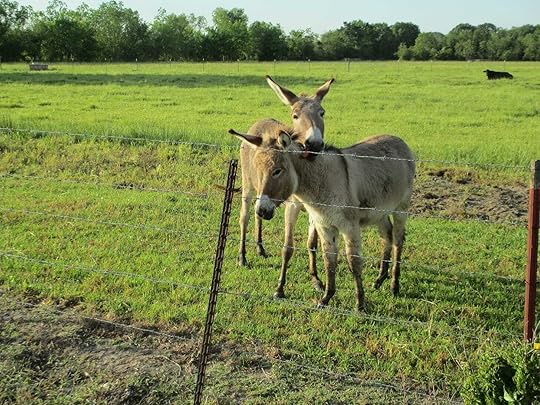
There are cows in the field as well, maybe seven or eight. Gaywynn tells me that the donkeys are there to protect the cows and their calves from coyotes. We have coyotes here. You can hear them at night. Most places do these days. I found this at Mother Earth News: “Donkeys are naturally aggressive to canines [i.e., dogs, coyotes]. They will charge the threat and attempt to chase it away. They may slash out with their hooves or turn and kick the predator.” That would deter me, I assure you, if I were a coyote.
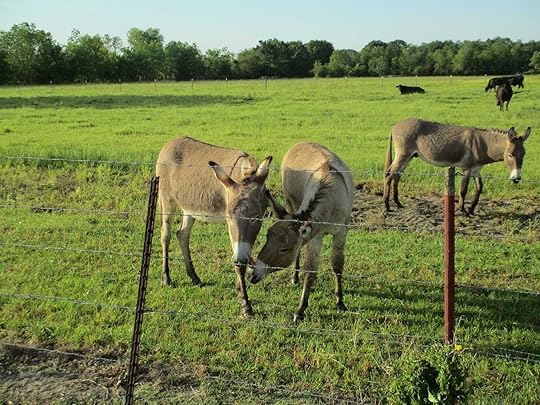
By the way, I found that the donkey’s reputation for stubbornness is not because of some innate sense of contrariness. According to Wiki, “this [trait] has been attributed to a much stronger sense of self-preservation than exhibited by horses…it is considerably more difficult to force or frighten a donkey into doing something it perceives to be dangerous.” I would say their instincts are sound when it comes to humans.
Every time we drive to town or return, we look for the little donkey grazing beside its mother. We stop the car and watch him. It’s a country road, little used, so we can linger. We do. He’s such a sweet-looking creature—small, fluffy, soft. Sometimes we can’t see him, because he’s in a remote part of the field where, I suspect, the grass is greener. That brings a small sense of disappointment to us. But we’ll be back, going to town and then returning. We will see him again. We don’t want him to grow up. One day, all too soon, though, he will, and we won’t know the difference between him and his mother and his father. We still can, though, and that brightens our comings and goings.



